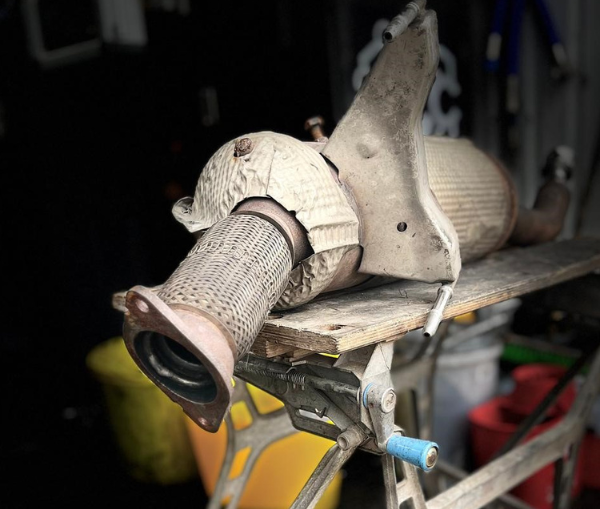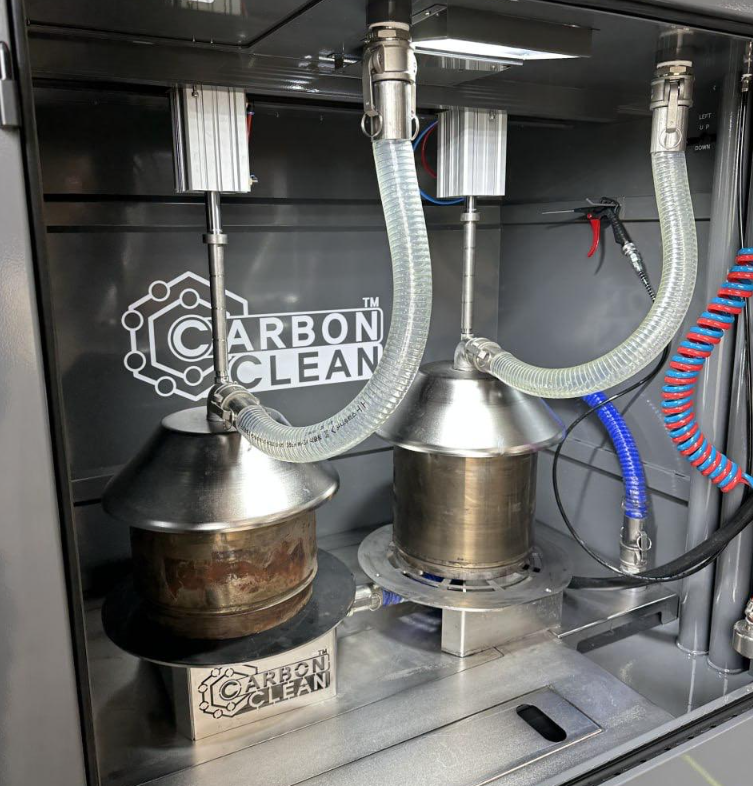Diesel Particulate Filters
Diesel particulate filters (otherwise known as DPFs) are a filter installed on the exhaust system of modern diesel vehicles in order to greatly reduce the level of soot emitted out of the vehicle into the atmosphere. The soot particles are trapped in the DPF until a sufficient exhaust temperature is reached to burn them off turning the harmful particles into carbon dioxide, this is called DPF regeneration.
DPF Issues
One of the main issues with vehicles fitted with a DPF is blockage caused by short or low-speed journeys. The exhaust system never reaches the temperature needed for regeneration, so soot builds up inside the filter and eventually restricts flow.
This is a familiar problem for many Jaguar and Land Rover owners, especially those using their cars mainly for school runs or commuting. As backpressure rises, the vehicle may trigger warning lights, enter limp mode, or attempt repeated regens.
Regular motorway runs and scheduled DPF servicing can help avoid expensive failures and keep emissions systems operating correctly.
Symptoms Of A Failing DPF
Blocked DPFs usually present a few symptoms, including triggering an engine management light and sending the vehicle into limp mode. Some vehicles will also show a red DPF light on the dash and display a message saying “Exhaust filter full visit dealer to clear” or similar. At this point diagnostic equipment is needed to try and force a regeneration to clear out the system, if that doesn’t work, cleaning of the filter can be attempted, and if that still does not allow for the fault to be cleared, a new DPF will be required and due to the exotic materials used in their construction, these are not cheap.
Because of their cost, it is better to keep the DPF clear and passively regenerating by itself regularly, you may even see a yellow warning light informing you that a regeneration needs to take place. This is achieved by regularly running the vehicle at motorway speeds for 30 minutes or more, if this does not happen, and the temperatures associated with motorway speeds are not regularly reached, the DPF will attempt an “active regeneration” where extra fuel is injected during combustion to force raised engine temps, the issue with active regen is that this extra fuel won’t all be burnt off on a short journey and the unburnt fuel will dilute the engine oil over time, weakening its lubrication properties. This means that unless the oil is changed regularly, there is a chance that the engine will not be lubricated properly, generally leading to a turbo failure or potentially an engine failure. At K Motors we have actually seen engines with fuel making up 40% of the oil contents in the sump!
This table below contains a list of Land Rover and Jaguar models using diesel particulate filters
| Model | Engine | Year | Standard / Optional |
|---|---|---|---|
| Defender | 2.2 Tdci | All Models | Standard |
| New Defender | All Diesel Engines | All Models | Standard |
| Freelander 2 | 2.2 Diesel | 2006-2010 (Models with C or E as the 8th character in their VIN) | Optional |
| Freelander 2 | 2.2 Diesel | 2010 On | Standard |
| Discovery 3 | 2.7 Diesel | 2007 On | Optional |
| Discovery 4 | 3.0 Diesel | 2010 models (Models with G as the 8th character in their VIN) | Optional |
| Discovery 4 | 3.0 Diesel | 2011 On | Standard |
| Discovery 5 | All Diesel Engines | All Models | Standard |
| Discovery Sport | All Diesel Engines | All Models | Standard |
| Range Rover Evoque L538 | All Diesel Engines | All Models | Standard |
| Range Rover Evoque L551 | All Diesel Engines | All Models | Standard |
| Range Rover Velar | All Diesel Engines | All Models | Standard |
| Range Rover Sport L320 | 2.7 Diesel | 2007 on | Optional |
| Range Rover Sport L320 | 3.0 Diesel | Models up to 2011 | Optional |
| Range Rover Sport L320 | 3.6 Diesel | 2008 to 2011 | Optional |
| Range Rover Sport L320 | 3.0 Diesel | 2011 On | Standard |
| Range Rover Sport L320 | 3.6 Diesel | 2011 On | Standard |
| Range Rover Sport L494 | All Diesel Engines | All Models | Standard |
| Range Rover Sport L461 | All Diesel Engines | All Models | Standard |
| Range Rover L322 | 3.6 Diesel | 2008 On | Optional |
| Range Rover L322 | 4.4 Diesel | All Models | Standard |
| Range Rover L405 | All Diesel Engines | All Models | Standard |
| Range Rover L460 | All Diesel Engines | All Models | Standard |
| Jaguar XE | All Diesel Engines | All Models | Standard |
| Jaguar XF (X250) | All Diesel Engines | All Models | Standard |
| Jaguar XF (X260) | All Diesel Engines | All Models | Standard |
| Jaguar XJ (X350) | All Diesel Engines | All Models | Standard |
| Jaguar XJ (X351) | All Diesel Engines | All Models | Standard |
| Jaguar E-Pace | All Diesel Engines | All Models | Standard |
| Jaguar F-Pace | All Diesel Engines | All Models | Standard |
How To Tell If Your Vehicle Has A DPF?
As mentioned in the table above, most modern diesel JLR vehicles are equipped with a DPF, but if you have a model in those first few years where particulate filters transitioned from being an optional extra into standard equipment, there can be some confusion. Some will say if your tailpipes are angled downwards, you have a DPF, others say the opposite. Realistically, the easiest way to tell is to have a look underneath the vehicle and see if you have a bulky cylindrical chamber downstream of the manifold but in front of the first silencer.
It is also worth noting that new petrol vehicles are being equipped with similar filtration technology now as well in order to adhere to ever tightening emissions regulations but this will not be common practice for a few more years.
What Should I Do If My Car Has A DPF?
If you have a vehicle equipped with a DPF and regularly drive at high speeds for 30 minutes or more, there is no need to worry. If you use your vehicle for short journeys however, you will need to be mindful of when an active regeneration is in progress (characterised by a raised and lumpy idle and reduced fuel consumption as well as a warning light on some models) and ensure the regeneration cycle is completed before switching off.
It is also strongly recommended that you get your oil changed at least once a year to ensure the engine is not running on diluted oil, even if your car is not telling you that you need a service yet.
DPF Refurbishment at K Motors
We’ve invested in the latest Carbon Clean DPF refurbishment system, purpose-built for Land Rover and Jaguar vehicles. This advanced machine restores most blocked or restricted DPFs to near-new performance by removing soot and ash from deep within the filter substrate, something on-car regeneration can’t achieve. Each unit is fully pressure-tested and flow-checked under the supervision of our trained technicians to ensure it performs correctly once refitted.
The full refurbishment service is priced at £295 plus the associated labour for removal and refitting. Compared with replacement, which can exceed £1000, this process offers exceptional value and reliability. If your vehicle is showing DPF warnings, reduced power, or frequent regens, booking a professional refurbishment now can prevent further damage to turbos, sensors, and EGR systems. Contact us to arrange testing or book a DPF service slot, most units are refurbished and reinstalled within 24 hours.






